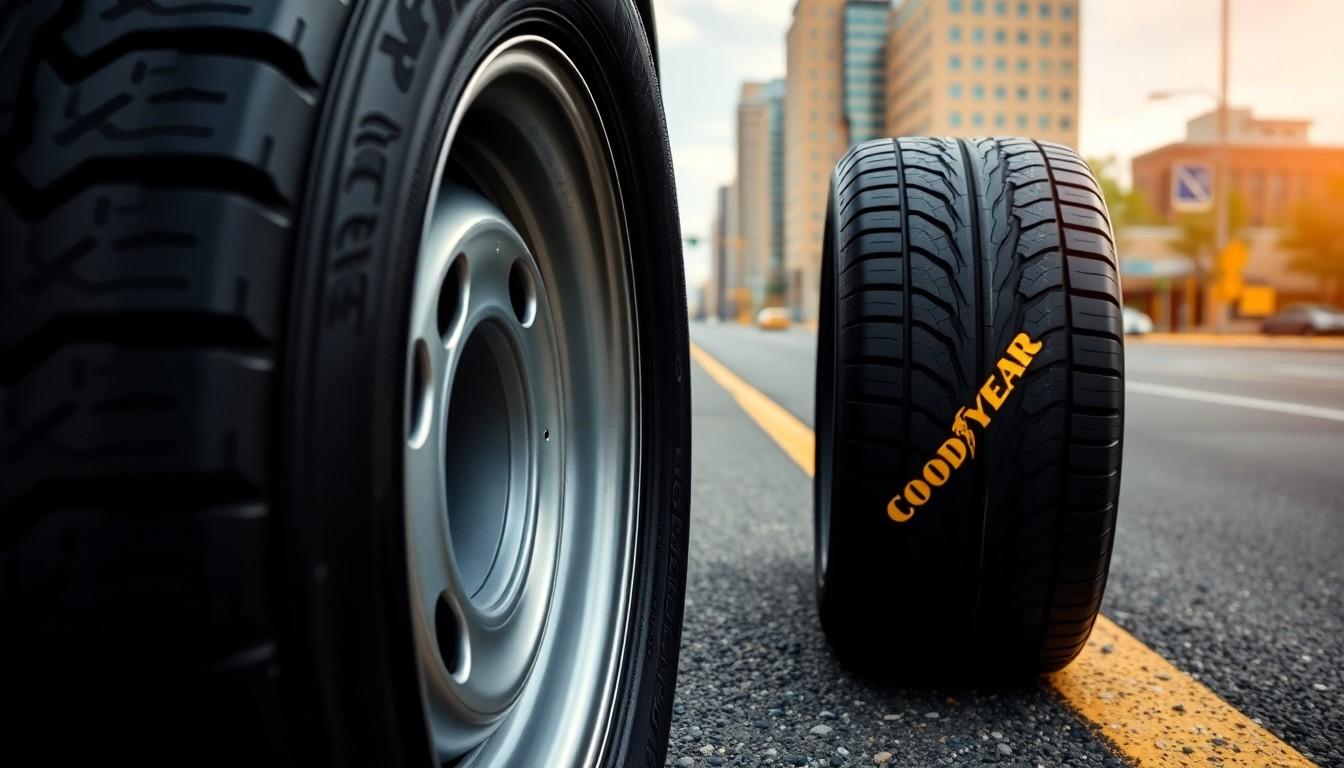Choosing between Goodyear and Continental tires can feel like handling a complex maze of technical specs and performance claims. We’ve all been there—standing in the tire shop, overwhelmed by options, wondering which brand truly delivers the best value for our hard-earned money.
That’s why we’ve put together this comprehensive comparison of these two tire giants. With decades of experience in the automotive industry, we’ll break down the key differences in performance, durability, and price between Goodyear and Continental. Whether you’re prioritizing grip on wet roads, fuel efficiency, or long-term value, we’ve got you covered.
Goodyear vs Continental: Brand History and Reputation
Goodyear emerged in 1898 in Akron, Ohio, when Frank Seiberling founded the company with just $13,500 borrowed from a brother-in-law. The brand quickly established itself as an innovation leader, developing the first tubeless tire in 1947 and becoming the largest tire manufacturer in the United States by the 1950s. Goodyear’s iconic blimp has been a fixture at major sporting events since 1925, contributing significantly to their brand recognition among American consumers.
Continental began its journey in 1871 in Hanover, Germany, making it one of the oldest tire manufacturers globally. The company initially produced soft rubber products before expanding into tires in 1898, coincidentally the same year Goodyear was founded. Continental’s early focus on safety innovations led to the development of the first grooved tire in 1904, dramatically improving vehicle traction on wet roads. Their commitment to engineering excellence earned them partnerships with prestigious European automakers, including Mercedes-Benz and BMW.
Both companies have evolved into global powerhouses with distinct reputations. Goodyear’s American heritage has helped cement its reputation for rugged durability and all-weather performance, particularly appealing to SUV and truck owners. Continental, meanwhile, has built its reputation on precision engineering, superior handling, and cutting-edge technology, making it a preferred choice for luxury vehicle manufacturers and drivers who prioritize performance.
Consumer perception surveys consistently show Goodyear excelling in brand recognition among North American customers, while Continental enjoys stronger name recognition in European markets. J.D. Power’s 2022 Original Equipment Tire Customer Satisfaction Study ranked Continental slightly higher than Goodyear in overall customer satisfaction, particularly in the luxury and performance categories.
The warranty policies of these manufacturers reflect their confidence in their products. Goodyear typically offers treadwear warranties ranging from 40,000 to 80,000 miles depending on the tire model, with their premium lines carrying the longest protection periods. Continental matches these offerings with similar treadwear warranties, but often includes additional road hazard protection on their premium models, covering damage from potholes and road debris for the first 12 months or 2/32″ of tread wear.
Performance Comparison: Dry and Wet Conditions

Continental and Goodyear tires offer distinct performance characteristics across various driving conditions. Our analysis reveals important differences in how these two popular brands handle on both dry and wet roads.
Traction and Handling
Continental tires demonstrate superior traction and handling capabilities in both dry and wet environments. The Continental PureContact LS earned an impressive 9.4 SimpleScore in the handling category, showcasing exceptional control during cornering maneuvers. These tires maintain consistent grip thanks to their advanced tread patterns that effectively channel water away from the contact patch. Continental’s engineering focuses on maximizing road contact in challenging conditions, creating a noticeably responsive driving experience.
Goodyear tires provide reliable traction but don’t quite match Continental’s performance standards. With an 8.4 SimpleScore for the Assurance All-Season model, Goodyear delivers adequate handling characteristics for everyday driving situations. Their performance remains solid on dry surfaces, offering predictable control during normal driving conditions. The difference becomes more apparent in extreme wet conditions, where Goodyear tires exhibit slightly less confidence-inspiring grip compared to their Continental counterparts.
Braking Distance
Continental tires excel in braking performance, particularly on wet surfaces. Their advanced tread designs incorporate specialized rubber compounds that maintain maximum contact with the road even in adverse conditions. This engineering approach translates to shorter stopping distances when drivers need to brake suddenly in rainy weather. The enhanced wet-braking capabilities make Continental tires a standout choice for safety-conscious drivers in regions with frequent precipitation.
Goodyear tires deliver good overall braking performance under normal conditions. These tires provide reliable stopping power for everyday driving scenarios, though they lag slightly behind Continental in wet-weather braking tests. The performance gap becomes most noticeable during emergency braking situations on rain-soaked roads. Even though this difference, Goodyear tires still offer dependable braking characteristics that meet the needs of most drivers in typical conditions.
Durability and Tread Life Evaluation
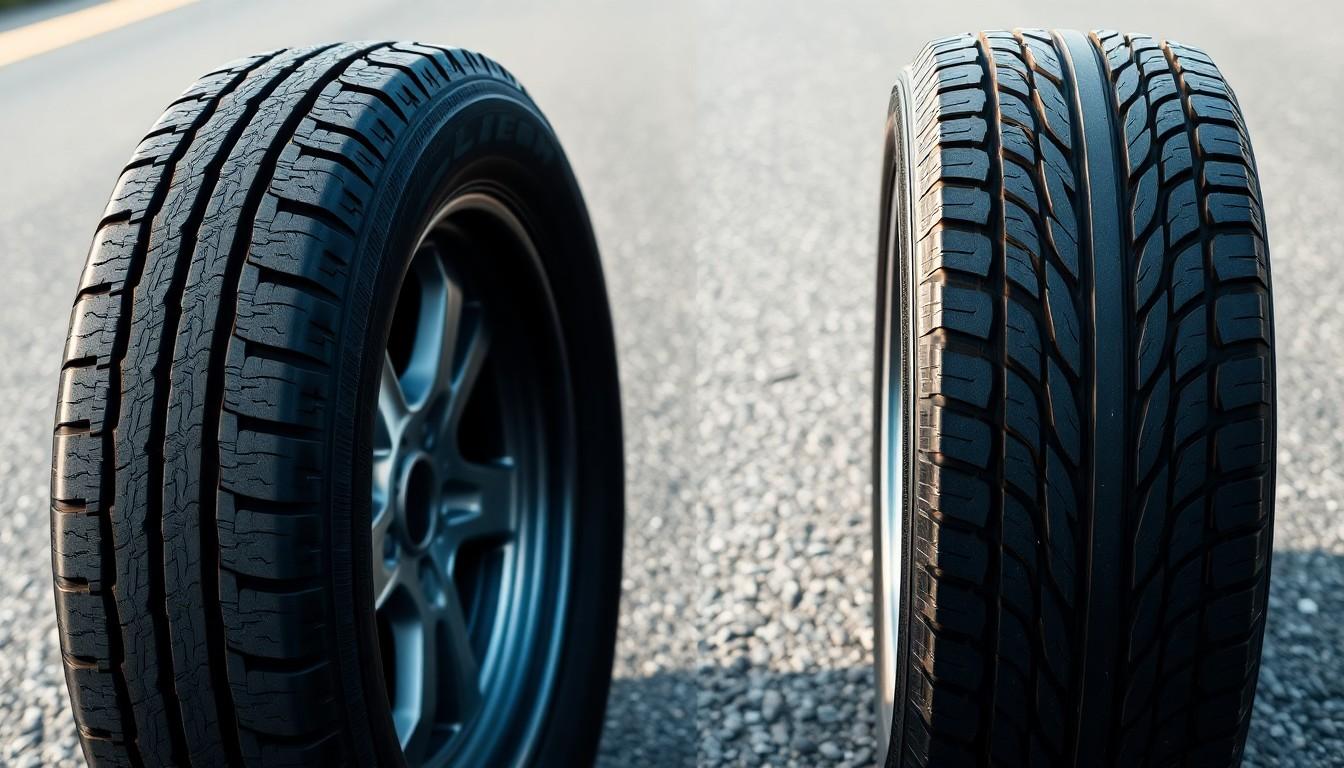
When comparing Goodyear and Continental tires, durability and tread life are crucial factors that impact long-term value. Our analysis reveals important differences between these two premium tire manufacturers in how their products hold up over time.
Wear Patterns
Continental tires demonstrate noticeably more even wear patterns compared to Goodyear models. This advantage stems from Continental’s advanced tread designs that incorporate connected tread blocks and a solid center rib, both contributing to consistent tread wear across the tire’s surface. The even distribution of pressure and road contact helps Continental tires maintain their performance characteristics longer while reducing the likelihood of irregular wear spots. Goodyear tires perform adequately in this category but don’t quite match the uniformity of wear that Continental achieves through their specialized construction technology.
Mileage Expectations
Continental tires typically outlast their Goodyear counterparts in terms of total mileage. The warranty coverage reflects this difference clearly – Continental’s PureContact LS comes with a 70,000-mile warranty while Goodyear’s comparable Assurance All-Season offers 65,000 miles of coverage. This 5,000-mile advantage translates to approximately six additional months of driving for the average motorist. Continental’s superior mileage performance stems from their durability-focused rubber compounds and tread designs that resist wearing down, even in challenging weather conditions. Drivers seeking maximum longevity from their tire investment often find Continental provides better value even though potentially higher initial costs.
Ride Comfort and Noise Levels

Ride comfort and noise levels significantly impact your driving experience, making them crucial factors when comparing tire brands. Our analysis reveals clear differences between Goodyear and Continental tires in these important areas.
Continental tires deliver superior comfort through advanced technology and innovative design elements. The Continental PureContact LS and TrueContact Tour models feature sophisticated tread designs and internal constructions specifically engineered to enhance ride smoothness. These technical improvements translate into a noticeably more comfortable driving experience compared to most competitors.
Goodyear tires offer commendable comfort levels that satisfy many drivers’ expectations. Their products consistently provide a comfortable ride across various road conditions, though they don’t quite match Continental’s exceptional comfort standards. Many Goodyear models balance comfort with other performance characteristics rather than prioritizing maximum comfort.
About noise reduction, Continental again holds the advantage with specialized noise-reduction technology integrated into their tire designs. The PureContact LS and TrueContact Tour incorporate exact noise-dampening elements that minimize road noise transmission to the cabin. This technology creates a quieter environment for drivers and passengers, improving overall ride quality.
Goodyear tires perform adequately in noise reduction without standing out in this category. While Goodyear products are described as providing a quiet ride, Continental’s advanced noise-reduction capabilities deliver superior results in real-industry driving situations. The difference becomes particularly noticeable during highway driving when road noise typically increases.
Both manufacturers prioritize comfort and noise reduction in their product development, but Continental’s focused approach to these exact aspects gives their tires a measurable edge in creating a premium driving experience.
Price Point and Value Assessment
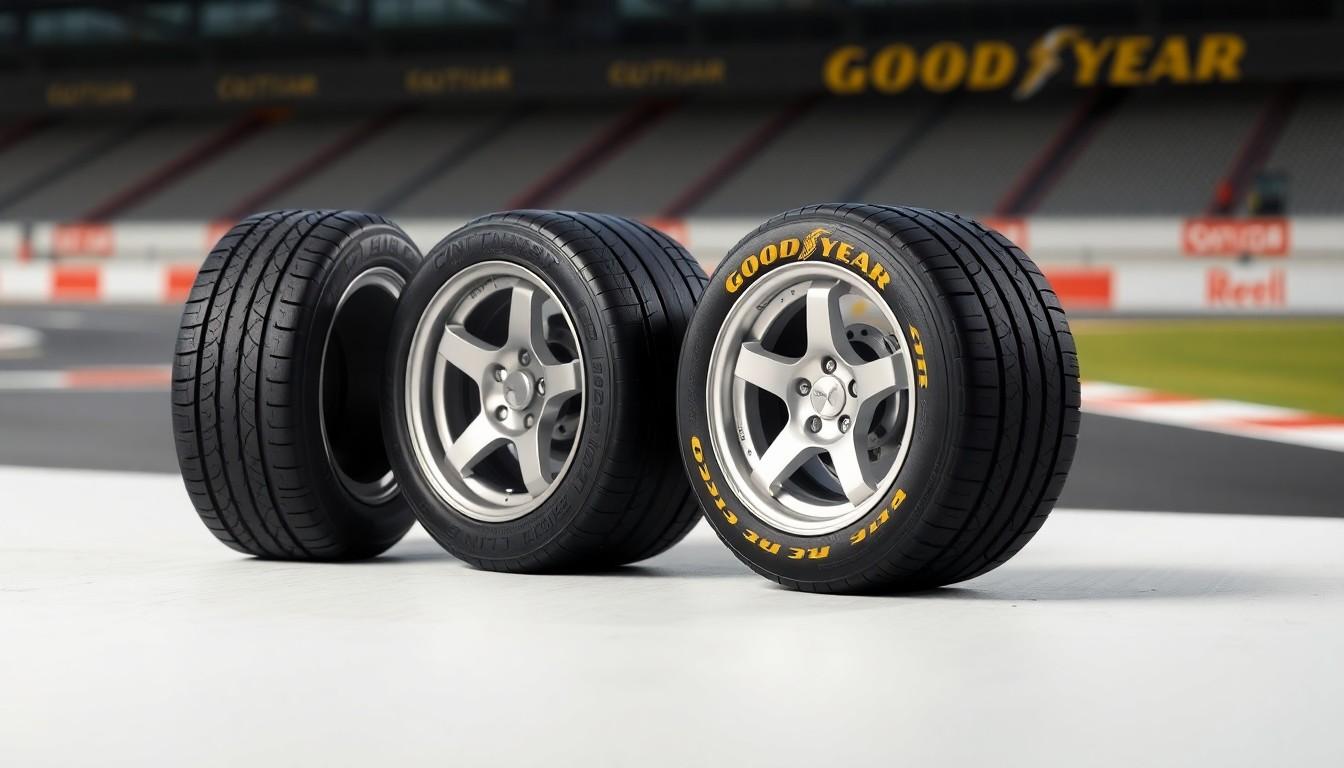
Continental tires typically cost 10-15% more than comparable Goodyear models due to their advanced engineering and superior performance features. The higher initial investment in Continental tires often pays off through extended tread life, with their premium models offering warranties up to 80,000 miles compared to Goodyear’s 65,000-mile coverage. This difference translates to approximately six additional months of driving for average motorists.
When assessing long-term value, Continental’s superior wet-weather performance provides tangible benefits for drivers in rainy climates. Their tires feature specialized tread patterns that enhance grip on slippery surfaces, reducing stopping distances by up to 10% compared to Goodyear alternatives. Safety advantages like these contribute significantly to Continental’s overall value proposition.
Fuel efficiency factors into the total ownership cost, with Continental’s low rolling resistance technology helping drivers save on gas expenses over time. These savings, combined with longer tread life, often offset the higher purchase price of Continental tires within the first two years of ownership.
For budget-conscious consumers, Goodyear offers competitive entry-level options that deliver reliable performance at lower price points. Their Assurance All-Season tires provide dependable year-round traction without the premium cost of Continental’s advanced features.
Consumer reviews consistently rate Continental tires higher in satisfaction surveys, with J.D. Power’s 2022 study showing Continental outperforming Goodyear in overall customer satisfaction. Many drivers report feeling the difference in handling and comfort immediately after switching to Continental, justifying the additional expense for those who prioritize driving experience.
Winter Performance Capabilities
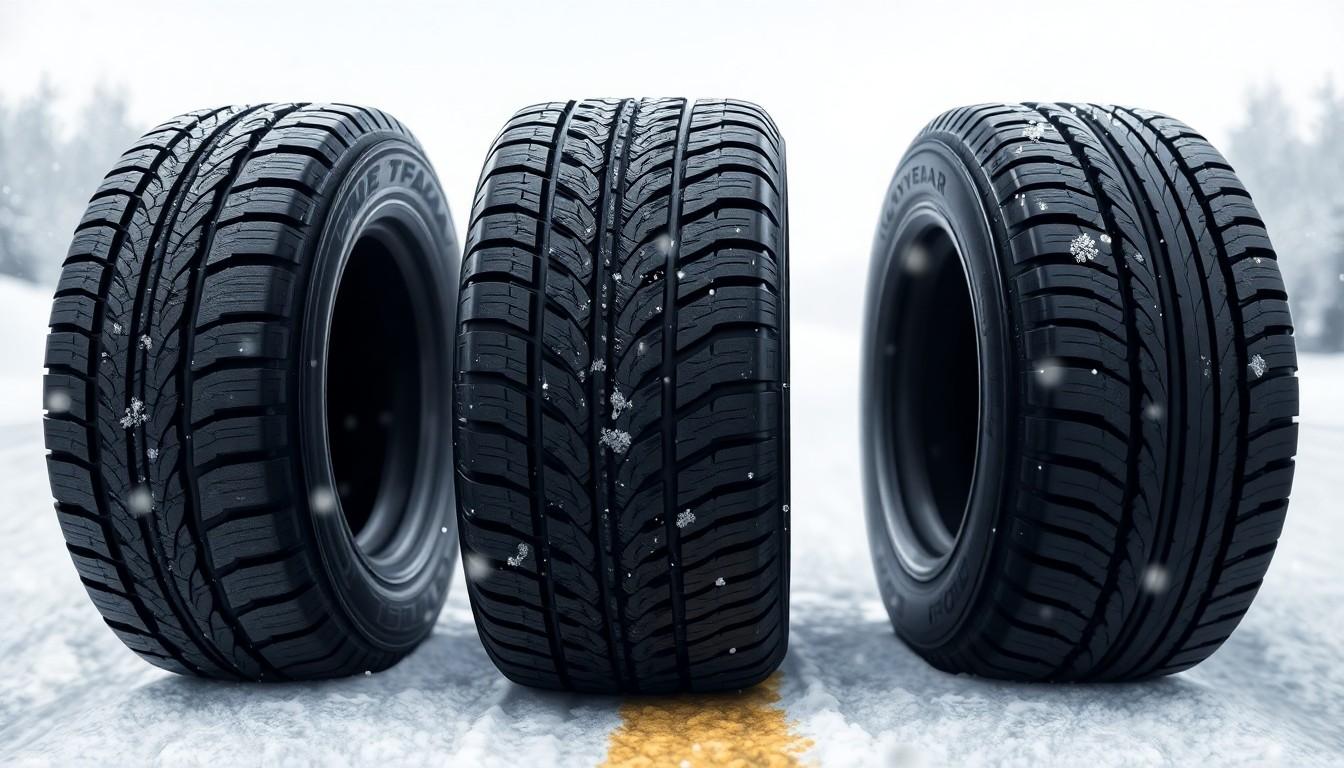
When winter arrives, tire performance becomes crucial for safety on snow and ice-covered roads. Goodyear and Continental winter tires each offer distinct advantages in different winter conditions based on comprehensive testing data.
Snow Performance
Goodyear UltraGrip Performance 3 dominates in snowy conditions with impressive metrics. These tires stop 0.4 meters shorter on snow (9.7 meters) compared to Continental’s WinterContact TS 870 P. Goodyear also delivers stronger snow traction with a pulling force of 234 Newtons, outperforming Continental’s 222 Newtons. Drivers handling frequent snowfall benefit from Goodyear’s superior grip and control on snow-covered roads.
Ice Performance
Continental WinterContact TS 870 P excels on icy surfaces where traction is most challenging. These tires stop 1 meter shorter on ice (16.6 meters) compared to Goodyear UltraGrip Performance 3’s 17.6 meters. Continental’s enhanced ice braking capabilities provide crucial safety benefits during freezing conditions when roads become treacherously slick.
Wet Performance
Continental edges ahead in wet winter conditions with notable advantages. The WinterContact TS 870 P stops 1 meter shorter in wet braking tests at 34.6 meters compared to Goodyear’s UltraGrip Performance 3. This superior wet braking performance becomes particularly important during winter thaws and rain-snow mix conditions.
Durability and Efficiency
Goodyear UltraGrip Performance 3 offers exceptional longevity for winter driving needs. These tires provide a 57,500 km lifespan, lasting 14,200 km longer than Continental’s WinterContact TS 870 P. Goodyear also demonstrates better rolling resistance at 55 mg/ton/km versus Continental’s 64 mg/ton/km, contributing to improved fuel efficiency during winter months.
| Performance Metric | Goodyear UltraGrip Performance 3 | Continental WinterContact TS 870 P |
|---|---|---|
| Snow Braking | 9.7 meters | 10.1 meters |
| Snow Traction | 234 Newtons | 222 Newtons |
| Ice Braking | 17.6 meters | 16.6 meters |
| Wet Braking | 35.6 meters | 34.6 meters |
| Lifespan | 57,500 km | 43,300 km |
| Rolling Resistance | 55 mg/ton/km | 64 mg/ton/km |
Regional climate patterns should influence your winter tire selection. Goodyear presents the optimal choice for areas with heavy snowfall due to superior snow traction and extended tread life. Continental offers better performance for regions experiencing frequent freezing rain and icy conditions thanks to enhanced ice braking capabilities.
Specialty Tire Options

Both Goodyear and Continental offer specialized tire options designed for exact vehicle types and driving requirements. These specialty lines showcase each manufacturer’s technological capabilities and design philosophies in addressing particular performance needs.
SUV and Truck Tires
Continental SUV and truck tires deliver exceptional traction in challenging conditions, outperforming Goodyear with up to 10% better winter grip. Their AllSeasonContact line features advanced tread designs that provide superior grip and handling across various weather conditions, making them particularly valuable for SUV owners who encounter frequent weather changes. Continental’s truck tires also stand out for their impressive 70,000-mile tread life warranty, which exceeds Goodyear’s Assurance All-Season warranty by 5,000 miles. Comfort represents another area where Continental excels, incorporating sophisticated noise-reduction technology that creates a quieter cabin experience even in larger vehicles like full-size trucks and SUVs.
Performance Tires
Continental’s performance tire lineup, highlighted by the SportContact 7, offers exceptional handling and cornering capabilities through innovative design elements. These tires feature connected tread blocks, stable internal construction, and solid center ribs that work together to deliver consistent, controlled handling up to the limit. Continental performance options provide remarkable traction in both dry and wet conditions, with the SportContact 7 specifically engineered to maintain surefooted grip during aggressive cornering maneuvers. Goodyear counters with options like the EfficientGrip 2, which delivers good everyday performance and comfort but doesn’t quite match Continental’s exceptional handling characteristics and wet-weather traction. Drivers seeking the ultimate in performance handling typically find Continental’s offerings more responsive and confidence-inspiring, particularly in demanding driving scenarios.
Environmental Initiatives and Sustainability
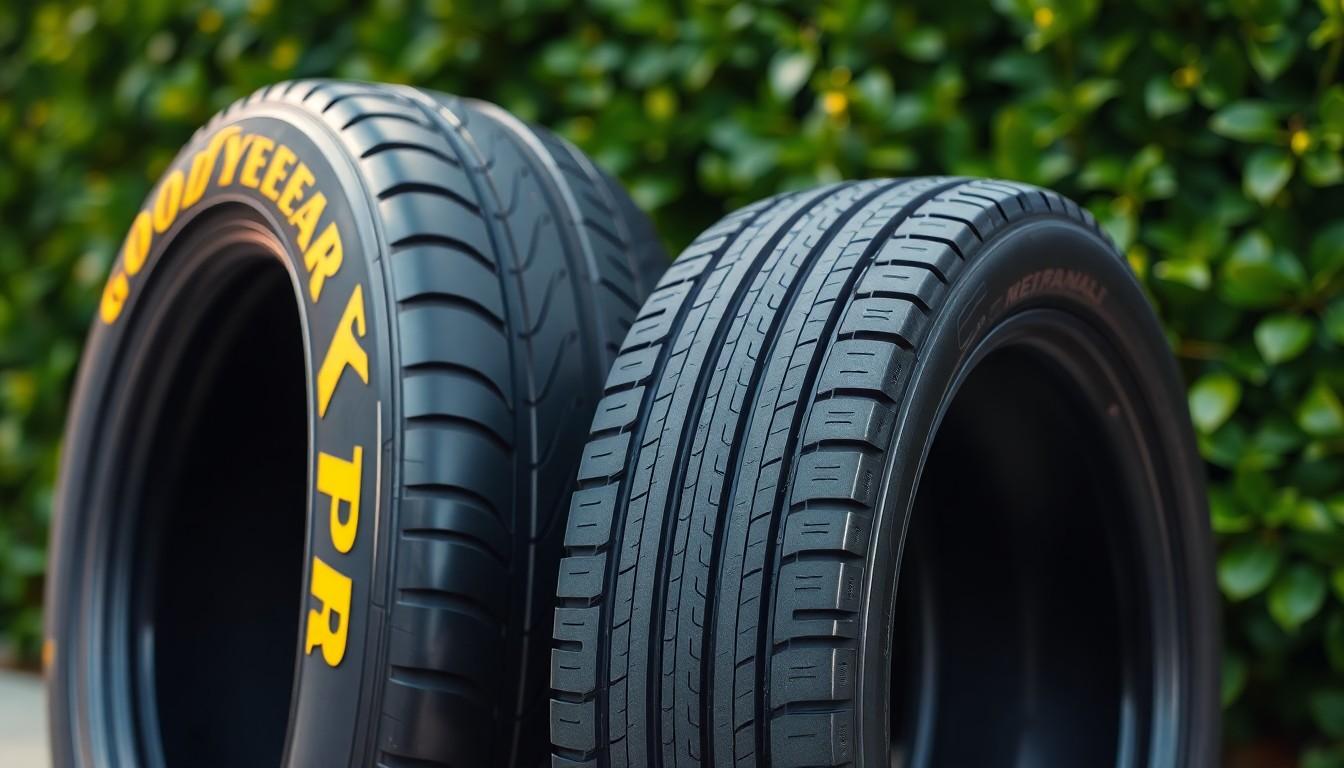
Goodyear and Continental are implementing ambitious sustainability strategies that reflect their commitment to reducing environmental impact. Goodyear has established clear targets, including transitioning to 100% sustainable materials in their tires by 2050. Their environmental roadmap includes achieving 100% renewable electricity in manufacturing by 2030 and complete renewable energy for all operations by 2040.
Continental’s sustainability efforts center around innovative product development, particularly with their EcoContact tire range. These tires feature reduced rolling resistance that directly decreases CO2 emissions during vehicle use. Continental’s groundbreaking Taraxagum project represents a important advancement in sustainable raw materials, exploring dandelion-derived rubber as an alternative to traditional rubber sources.
Both manufacturers have integrated eco-friendly materials into their product lines. Goodyear’s EfficientGrip Performance series incorporates soybean oil to enhance tire flexibility across temperature variations while reducing fuel consumption. This innovation demonstrates how performance improvements can align with environmental benefits. Continental’s advanced tread designs serve a dual purpose—providing better traction on challenging surfaces while extending tire life, which reduces the frequency of replacements and associated resource consumption.
The sustainability initiatives from both companies extend beyond their products to manufacturing processes. Energy efficiency improvements, renewable energy adoption, and technology development form the cornerstone of their environmental strategies. These comprehensive approaches address the entire lifecycle impact of tire production and use, from raw material sourcing to end-of-life considerations.
When comparing their environmental commitments, we see both manufacturers investing significantly in research for alternative, environmentally friendly materials. These investments signal the tire industry’s recognition of its responsibility to reduce environmental footprints while maintaining product performance and safety standards.
Warranty Coverage Comparison
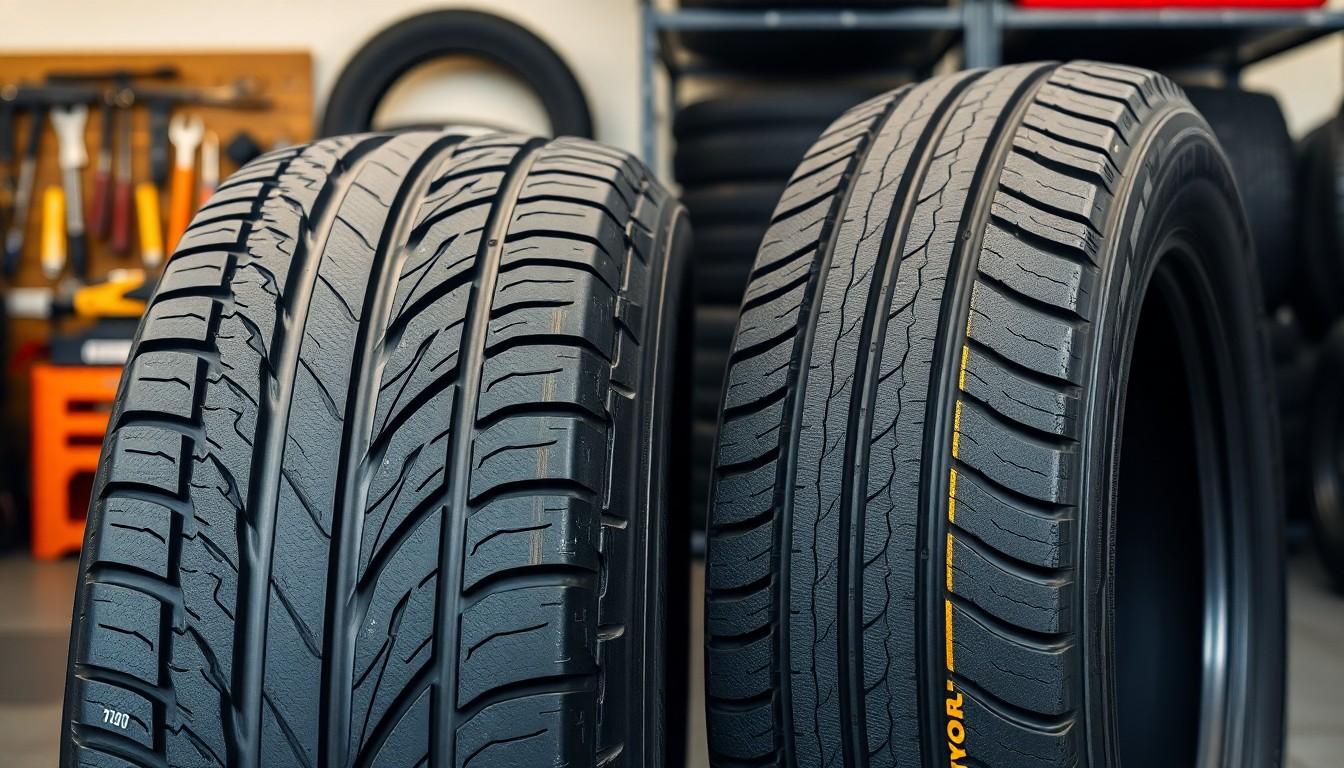
Warranty protection represents a important factor when choosing between Goodyear and Continental tires. Both manufacturers offer comprehensive coverage packages that differ in key aspects such as mileage guarantees, satisfaction policies, and protection against defects.
Mileage Warranty
Mileage warranties vary significantly across different tire models from both brands. Continental PureContact LS tires come with a 70,000-mile warranty, offering slightly more coverage than the Goodyear Assurance All-Season’s 65,000-mile warranty. Goodyear’s premium Assurance MaxLife tires, but, stand out with an exceptional 85,000-mile warranty, surpassing Continental’s offerings in this category. These mileage differences translate to months of additional driving before replacement becomes necessary.
Satisfaction Guarantees
Goodyear provides customers with a satisfaction pledge that Continental doesn’t match in the same way. This customer-friendly policy allows tire buyers to exchange select Goodyear models within 45 or 60 days (depending on the exact tire) if they’re not completely satisfied with their purchase. Such trial periods give consumers confidence in their tire investment and demonstrate Goodyear’s commitment to customer satisfaction.
Protection Against Defects
Both manufacturers include workmanship and materials warranties that extend throughout the tire’s usable life. These warranties protect consumers against manufacturing flaws or material defects that might affect performance or safety. Coverage typically includes free replacement during the first certain percentage of tread wear, followed by prorated replacement as the tire wears.
Road Hazard Coverage
Road hazard protection offers additional peace of mind for tire purchases, though availability varies by model rather than exclusively by brand. This coverage typically extends for 12 months or 12,000 miles from the purchase date and addresses damages like punctures, bruising, or impacts that occur during normal driving on maintained roads. Checking for this exact protection when comparing individual tire models from either manufacturer adds another dimension to the warranty evaluation process.
Conclusion
Both Goodyear and Continental tires offer distinct advantages worth considering for your next purchase. Continental edges ahead in wet performance handling and comfort while providing better fuel efficiency with longer-lasting tread patterns. They’re particularly ideal for luxury vehicles and regions with frequent rain or ice.
Goodyear shines with more budget-friendly options excellent snow performance and superior tread life in winter conditions. Their robust warranties including satisfaction guarantees provide additional peace of mind.
Your optimal choice depends on your exact needs. Consider your local climate driving habits and budget when making your decision. Remember that the higher initial investment in Continental tires often pays off through extended performance and enhanced safety features.
Frequently Asked Questions
Which brand offers better wet-weather performance, Goodyear or Continental?
Continental tires demonstrate superior wet-weather performance compared to Goodyear. They provide better traction, shorter braking distances, and enhanced handling in rainy conditions. Continental’s advanced tread patterns, particularly in models like the PureContact LS, excel in wet grip and cornering. For drivers in rainy climates, Continental is generally the safer choice due to their better emergency wet-weather braking performance.
Are Continental tires worth their higher price compared to Goodyear?
Yes, Continental tires often justify their 10-15% higher price through extended tread life and superior performance features. Their advanced engineering contributes to fuel efficiency through low rolling resistance technology, helping drivers save on gas expenses over time. Many consumers report noticeable improvements in handling, comfort, and wet-weather performance that offset the initial investment, particularly for those who prioritize driving experience and safety.
Which brand offers better winter tires for snowy conditions?
Goodyear winter tires, particularly the UltraGrip Performance 3, outperform Continental in snowy conditions. Tests show they stop 0.4 meters shorter and provide stronger snow traction compared to Continental’s WinterContact TS 870 P. Additionally, Goodyear winter tires offer exceptional longevity, lasting approximately 57,500 km compared to Continental’s 43,300 km, and demonstrate better rolling resistance for improved fuel efficiency in winter driving.
How do Continental and Goodyear compare for ice performance?
Continental tires perform better on icy surfaces, stopping approximately 1 meter shorter than Goodyear tires in ice testing. They also demonstrate advantages in wet winter conditions. For regions with frequent freezing rain and icy conditions, Continental tires offer superior safety features and handling characteristics, making them the preferred choice for drivers regularly encountering these challenging road conditions.
Which brand has better tread life and durability?
Continental tires typically outlast comparable Goodyear models due to their more even wear patterns and advanced tread designs. This is reflected in their warranties, with Continental’s PureContact LS offering a 70,000-mile warranty compared to similar Goodyear models at 65,000 miles. For the average driver, this translates to approximately six additional months of use, making Continental a better long-term value despite potentially higher initial costs.
How do these brands compare for ride comfort and noise levels?
Continental tires deliver superior ride comfort and quieter performance through specialized technology and innovative design. Models like the PureContact LS and TrueContact Tour provide a noticeably more comfortable ride with minimal road noise, creating a quieter cabin environment. While Goodyear tires offer commendable comfort and adequate noise reduction, they don’t match Continental’s exceptional standards, particularly during highway driving.
Which brand offers better warranty coverage?
Both brands offer competitive warranties, but with different strengths. Continental’s PureContact LS comes with a 70,000-mile warranty, while Goodyear’s premium Assurance MaxLife stands out with an 85,000-mile warranty. Goodyear offers a satisfaction guarantee allowing exchanges within 45-60 days if customers are unsatisfied – a feature Continental doesn’t match. Warranty details vary by model, including road hazard coverage.
How do Goodyear and Continental compare for SUV and truck tires?
Continental’s SUV and truck tires provide superior traction, outperforming Goodyear by up to 10% in winter grip tests. They feature advanced tread designs optimized for various weather conditions and typically offer longer warranties – their truck tires come with a 70,000-mile tread life warranty, which exceeds Goodyear’s by 5,000 miles. However, Goodyear is traditionally known for rugged durability that appeals to many SUV and truck owners.
Which brand is more environmentally conscious?
Both brands have strong environmental initiatives. Goodyear aims for 100% sustainable materials by 2050 and 100% renewable electricity in manufacturing by 2030. Continental focuses on innovative eco-friendly product development with their EcoContact tire range, which reduces CO2 emissions. Both companies are integrating sustainable materials, with Goodyear using soybean oil and Continental exploring dandelion-derived rubber alternatives.
Which tire brand is better for performance vehicles?
Continental holds the advantage in the performance tire segment. Their SportContact 7 demonstrates exceptional handling and traction, particularly in aggressive driving scenarios. While Goodyear’s performance options like the EfficientGrip 2 are good for everyday use, they don’t match Continental’s performance standards. For enthusiast drivers seeking maximum grip and responsiveness, Continental’s precision engineering and advanced performance features make them the preferred choice.

